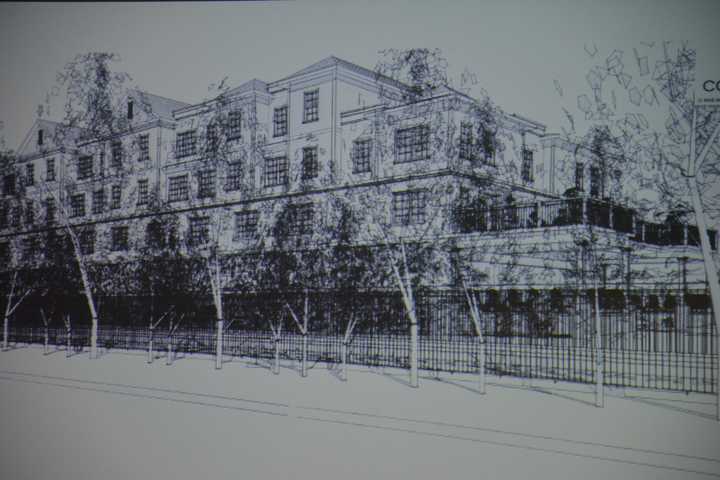The approval, Greenstein wrote, was granted on Dec. 29. The supervisor's report was also sent out in the town's email newsletter.
Granting of the building permit marks one of the last major steps that Conifer needs in order to build its long-awaited project, which is dubbed Chappaqua Station. Conifer will need another building permit for a second phase of the project, according to The Journal News, which reports that it would cover aspects such as fire prevention and HVAC construction.
The project entails a 28-unit apartment building of up to four stories being constructed on a site of roughly one-third of an acre near downtown Chappaqua. The parcel is bound by Hunts Place, the Saw Mill River Parkway's northbound exit ramp, the foundation of the Route 120 Bridge and Metro-North train tracks.
Conifer first proposed Chappaqua Station in 2010 and was granted approval for a special permit (pertaining to the overall project) in 2013, records show.
The site's location made the project immensely controversial over the years, as critics worried that the site conditions would pose safety hazards to occupants and emergency responses. Some argued that the site would result in isolating and stigmatizing would-be occupants.
None of the Town Board members who approved the special permit more than three years ago - the vote was by just 3-2 - are still on the board. All of the incumbent board members have voiced concerns about the project's merits in the past but agreed last year to not actively stop it.
In 2015, the town and Conifer spared in litigation over the applicable timetable for when the special permit expired, with Conifer arguing that it had a 25-year timetable while the town argued that it was 18 months. A judge ruled in the town's favor; the Town Board subsequently granted renewals for the special permit on multiple occasions, including late last year.
Conifer also had to secure building and fire code variances from a state review board, along with a land-related approval from the Metropolitan Transportation Authority (MTA). The developer also had to secure funding from Westchester County.
A group have residents sued the town to overturn the special permit, without successful. The residents also unsucessfully tried to persuade the MTA and the state review board to rule against Conifer
The project's apartments have been intended to count towards the county's 2009 affordable-housing settlement with the federal government, which required the county to have at least 750 units built in predominantly white municipalities by the end of 2016. Late last month, Westchester County Executive Rob Astorino announced that the benchmark was exceeded, with 790 units.
The settlement has not been officially concluded, however, as the county still needs to have a study submitted that looks at whether or not its municipalities have exclusionary zoning. Previous versions of the study that the county submitted were rejected by the federal government under the Obama administration; Astorino is optimistic that the incoming Trump administration will be more likely to approve a revised study.
Even if a Trump administration, which takes over on Jan. 20, gives its approvals for winding down the settlement, doing so must also be approved by U.S. District Court Judge Denise Cote. Astorino, at a recent press conference, was hopeful that Westchester will get Cote's approval.
In his report, Greenstein acknowledged that the federal government, specifically the Department of Justice, has not looked favorably upon the town's handling of the matter due the pace of the permit review, but vehemently denied that officials were malicious in intent.
Previous coverage of Conifer Realty can be found here.
Below is a copy of Greenstein's report, with italics added for visual differentiation:
Hunts Place
On December 29, 2016, the Town Building Inspector issued a “Phase I” Building Permit for the Chappaqua Station workforce housing project at 54 Hunts Place. The Building Inspector’s issuance of this building permit was based upon his determination that Conifer had satisfied all of the conditions set forth in the Special Permit issued by a prior Town Board in 2013. The Building Inspector is solely responsible for issuing building permits.
That said, I want to remind residents that the current Town Board worked hard to persuade Conifer to relocate its project to a different location, or alternatively, make it smaller, so it could provide better emergency access for first responders. In the end, we were not successful. We could not rewrite history. We could not change what a prior Town Board had done, and we were not able to persuade Conifer to change its plans.
The federal government has been very critical of our efforts to relocate or change this project. Just last month, the US Attorney’s Office accused the Town in court papers of “delaying, impeding, deterring, and obstructing the progress of Chappaqua Station.” I want to assure residents that the Town Board has done none of these things. What members of the Town Board have done, including myself, is express opinions about the project site. We have expressed concerns about safety, which were shared by our Building Inspector and others. And we have said that the building’s location is terrible, and may tend to stigmatize and isolate its future residents.
At all times, however, we have followed the law. I also want to say that when this building is finally built on Hunts Place, as now appears inevitable, I will be the first person in line, right along with my fellow Town Board members, to welcome its new residents to the community.
Click here to follow Daily Voice Chappaqua and receive free news updates.

